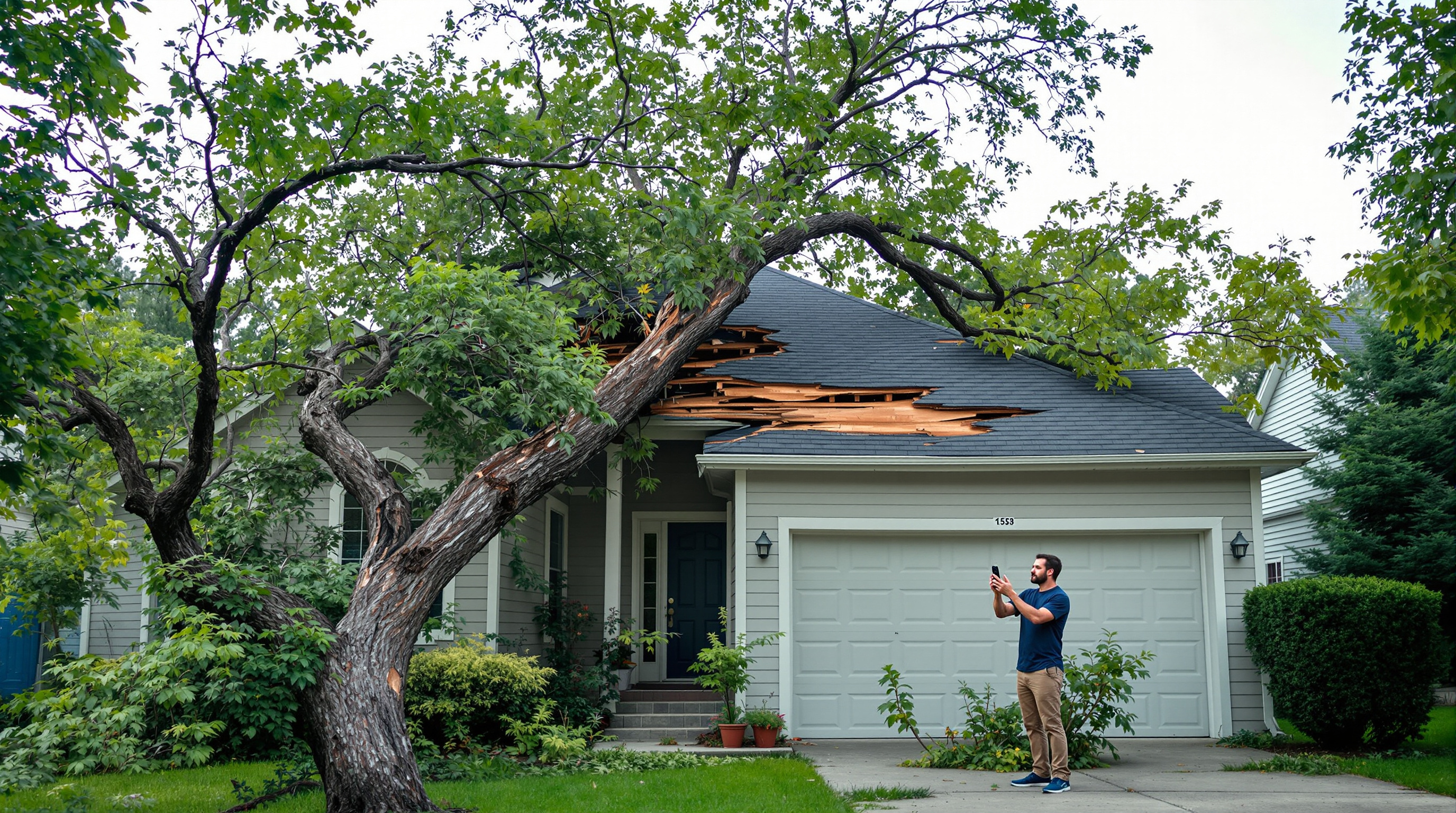Have you ever heard of the nightmare scenario where squatters take over your rental property and refuse to leave? Even though squatting is illegal in the United States, squatters’ rights and local and state laws can make it a hassle to regain control of your rental.
The legal process for evicting squatters can be lengthy and costly, leaving landlords feeling helpless and frustrated. However, there are proactive steps you can take to protect your property and your rights.
In this article, you’ll learn how to get rid of squatters, your options for legal recourse, and whether your landlord insurance can cover the associated legal expenses.
How to Identify Squatters on Your Property
Squatting is defined as occupying an abandoned or unoccupied property without the owner's permission. Squatters take up residence in various residential properties, including vacant homes, apartments, and even short-term vacation rentals. It may occur for several reasons, including financial instability, homelessness, or even as a form of protest.
Legal Criteria
Here are the four legal criteria that define squatting, according Nolo’s legal resources:
- Hostile, meaning without permission (though the definition can vary)
- Actual, meaning physical occupation
- Open and notorious, meaning the possession is obvious to onlookers
- Exclusive and continuous for a certain period of time
It's important to note that squatting is an illegal occupation of a building or land that does not belong to the occupier, while trespassing occurs when a person enters private property temporarily without permission. However, trespassing can turn into squatting if the perpetrator stays on the property for an extended period without permission.
Signs of Squatting
As a landlord, knowing how to identify squatters on your property helps you take quick action and prevent further unauthorized occupancy. Here are some best practices and signs to look for:
- Regularly check on your properties. Inspect your properties regularly, especially if you have vacant properties or are transitioning between tenants.
- Look for signs of occupancy. If you notice lights, garbage, or furniture inside the property, it's likely a sign the property is no longer vacant.
- Check for changes in utility usage. Look for utility bills suddenly appearing for a previously vacant property. This could indicate squatters have moved in.
- Keep an eye out for unauthorized copies of keys. If squatters have gained possession of the property, they may have copied the keys or even changed the locks, which could be a red flag.
- Ask neighbors for assistance. Your neighbors can be a great resource and alert you to any unusual activity on your property when you're not around.

Your Legal Rights as a Landlord
Generally, if a squatter is occupying your property without your permission, they are trespassing and have no right to be there. This means you have the right to take legal action to remove them.
You must follow the proper steps to remove squatters legally from your property. This process may involve serving them with a notice to vacate the premises or filing an eviction lawsuit.
However, it's essential to understand that this process may take time and can be complicated if squatters are legally considered tenants.
Moreover, landlords also need to know that the legal rights of squatters may vary depending on the situation and location of the property. For example, if they have been living on the property for a certain amount of time, they may have rights under adverse possession laws, making it more challenging to remove them.
The Process for Removing Squatters
Here are some common steps you can take as a landlord:
- Pursue informal solutions. Before pursuing legal action, you can talk to the squatters, negotiate, or seek a voluntary agreement.
- Issue a notice to vacate. This notice must be served before you initiate any eviction proceedings.
- File for an eviction. Start the legal process by filing an eviction notice at the local courthouse.
- Get a court order for eviction. Attend a court hearing and provide evidence that the squatters have no right to occupy the property.
- Hire law enforcement. You can ask for assistance from a sheriff's office, the local police department, or the US Marshals Service to oversee the eviction process, depending on your jurisdiction.
Note that landlords cannot forcefully remove squatters. If you do so, you may face legal consequences under both landlord-tenant laws and criminal statutes. You must follow the proper legal steps, regardless of the length of time the squatters have been occupying the property. This is especially crucial because squatters have legal rights that can further complicate the process.
Understanding Squatters’ Rights
As a property owner, it may seem unfair that squatters could have legal rights, but in some cases, they do. Squatters can gain legal rights through a doctrine called "adverse possession." This doctrine allows a person occupying a property for a specific period without the owner's permission to gain legal ownership of the property.
The time needed to gain legal ownership typically ranges from a few years to 20 years, depending on state law. During this time, a squatter must use the property openly, continuously, and exclusively.
While the requirements for adverse possession vary from state to state, they typically include things like the use of the property, the payment of taxes on the property, payments on utility bills, and more.
An adverse possession claim is difficult to prove and requires clear evidence, and state laws are quite stringent in these circumstances. Nonetheless, if squatters meet the requirements, they may be able to assume legal ownership of the property.
In addition to adverse possession, squatters may have some legal rights under various state laws, such as tenant rights or required procedures for eviction. To ensure you understand the laws governing squatting in your state, you may want to consult an attorney or refer to the American Apartment Owners Association's (AAOA) list of squatters' laws. This database contains information on laws regarding squatting in all 50 states.
Does Landlord Insurance Help with Squatters?
Since the eviction process requires several legal steps, squatters can be difficult to remove from your property. As a result, removing squatters may result in significant losses due to the legal costs of the process.
To help cover those costs, some insurance companies have started offering landlords specific coverage for squatting. Generally, this coverage helps cover a landlord's lost rental income; some policies may also cover the legal expense of evicting squatters.
In most cases, this type of coverage must be added as an endorsement to an existing policy and often involves an additional premium. Make sure to read your policy carefully since not all policies cover squatters or provide enough coverage for income loss, property damage, or liabilities caused by squatters.
In addition to understanding whether squatter coverage is included in their policy or is available as an endorsement, landlords must be aware of any restrictions or exclusions related to potential claims regarding squatters. For example, some policies exclude intentional acts committed by their tenants or require specific eviction procedures for the claim to be considered valid.
Tips for Avoiding Squatters
In addition to knowing your rights as a landlord and the legal rights of squatters, it's critical to avoid the situation in the first place. Here are a few tips to help you prevent squatters from entering your vacant property:
- Install security cameras. Security cameras can help deter trespassers because they can be used to monitor the property and detect any suspicious activity.
- Keep the property well maintained. A neglected property is more likely to attract squatters. Regular maintenance, such as mowing the lawn and trimming bushes, can help reduce the chance of someone illegally entering a home or other building on your property.
- Secure all doors and windows. Make sure all entry points are securely locked when not in use. Installing deadbolts and smart home devices that can be controlled remotely offer an extra layer of protection.
- Utilize trusted acquaintances. Ask family members, friends, or neighbors if they would be willing to periodically check in on your property, such as once a week. Knowing someone is actively watching your investment could provide peace of mind if you're a long-distance landlord.
- Use signage. Installing visible signs indicating that no trespassing is allowed alerts potential intruders that they are not permitted on the premises. Include your contact information on each sign in case any questions arise regarding property ownership.
Next Steps: Learn More about Protecting Your Rental Property
While there are many steps you can take to prevent damages and protect your investment, having landlord insurance can provide an added layer of security. With the right coverage, you can be confident you have protection when unforeseen circumstances arise.
Here are some additional resources to learn more about safeguarding your rental:







